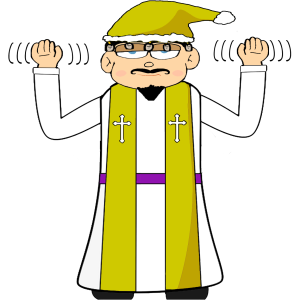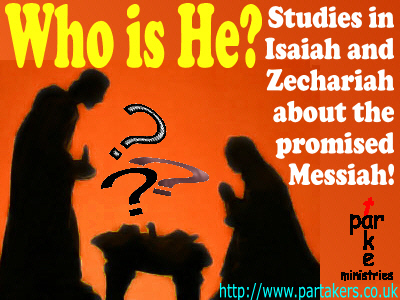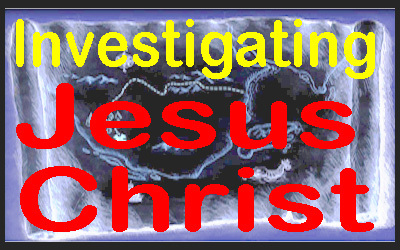
G’day and welcome to Partakers Christian Podcasts! Join us for uplifting Bible teaching, inspiring readings, heartfelt worship, powerful prayers, and fascinating church history. Whether you’re new to faith or growing deeper in your journey, we’re here to encourage and equip you. 🎧 Tune in, interact, and be inspired—wherever you are in the world.
Episodes

Tuesday Jan 02, 2024
God Gets His Hands Dirty 01
Tuesday Jan 02, 2024
Tuesday Jan 02, 2024

God Gets His Hands Dirty
01. Introduction
The birth of Jesus Christ is the most celebrated around the world. These celebrations are diverse and transcend cultures, peoples, and languages. Of course, most people stop with Jesus being a baby and continue no further with Him. Jesus Christ is the most unique person in history. Jesus Christ is also the most divisive person to be found at anytime and anywhere.
Almost everyone has an opinion about Him, even if that opinion is based on ignorance, silence or misinformation. Christians believe that Jesus’ birth was the culmination of thousands of years of God telling the world that He was coming. From the time of the Fall when people showed active rebellion and disobedience towards God in Genesis 3, God was planning the time when He would step into history as a saviour or messiah. Christians believe that Jesus Christ is this messiah.
Throughout the Old Testament, we see that the birth, life and mission of this Messiah is the aim and focus of attention. We see it in the stories of people such as Abraham and Moses. We see it in the nation of Israel, which was to be God’s light to all the nations. We see it in the Israelite sacrificial system and law. We see it during the time of the Judges and the Kings. We especially see it through the prophets. The whole Old Testament is joined together, because it all speaks about this Messiah baby, Jesus Christ. This baby, who was both 100% human and 100% divine, grew in wisdom and stature. This baby was born in order that He would die on a cross some 33 years later. He did not die for his own sins, but for the sins of the entire world – all past, present and future sins. This baby was born to die so that the entire world may have life and life everlasting, if an individual chooses to accept it.
As we go through this adventure, we start together, by looking only at what two people from the Old Testament, had to say about Jesus Christ. These two people we know as Isaiah and Zechariah. Let’s start the adventure together by looking at an introduction to these two books of the Bible.
Download the mp3 to continue learning more from this episode...
Click or Tap here to listen to or save this as an audio mp3 file

Wednesday Dec 27, 2023
Bible Thought - Why I am a Christian
Wednesday Dec 27, 2023
Wednesday Dec 27, 2023
Why I am a Christian!
"We accept man's testimony, but God's testimony is greater because it is the testimony of God, which he has given about his Son. Anyone who believes in the Son of God has this testimony in his heart. Anyone who does not believe God has made him out to be a liar, because he has not believed the testimony God has given about his Son. And this is the testimony: God has given us eternal life, and this life is in his Son. He who has the Son has life; he who does not have the Son of God does not have life." 1 John 5:9-12
Today I share the reasons I am a Christian, a follower of Christ. Come and hear my story!
Right mouse click to save/download this testimony as a MP3 file

Tuesday Dec 26, 2023
Pulp Theology 25 - God Gets His Hands Dirty
Tuesday Dec 26, 2023
Tuesday Dec 26, 2023

PulpTheology Book
"God Gets His Hands Dirty: The Story of Christmas"
Free on Kindle until end of Wednesday 27th December 2023. Click or tap here!
G’day! The book this week is "God Gets His Hands Dirty: The Story of Christmas". Inside this little book, there is something for you to learn afresh or be reminded about, regardless of who you are.
Ahhh Christmas. When people around the world remember that moment in time when God Himself, got his hands dirty and entered our world. Christmas is the most wonderful time of year! Christmas, where the birth of Jesus Christ is celebrated around the world - by Christians and others of all faiths and none. That is how God got his hands dirty. These celebrations are diverse and transcend cultures, peoples and languages.
Of course, most people stop with Jesus being a baby and continue no further with Him. Christians believe that Jesus’ birth was the culmination of thousands of years of God telling the world that He was coming and coming to show that God gets his hands dirty - transcending time and space.
In the Bible, the whole Old Testament is a united story which speaks about this event - the coming of the baby we know today as Jesus Christ. Written in short chapters and accessible language, we inspect together Christmas future through the eyes of Isaiah and Zechariah, before going on to look at Christmas past and Christmas present. Come inside to either learn afresh or be reminded of the people and events of the Christmas story - the why, how and who.
Whether you have not started the Christian journey yet, you are just starting your journey as a Christian, or have been a Christian for a while, you can either learn afresh or be reminded about the Church. Come on in!
"God Gets His Hands Dirty: The Story of Christmas" available on Amazon in paperback or Kindle with ISBN: 978-1506104348
Click or Tap here to listen to or save this as an audio mp3 file

Monday Dec 25, 2023
Merry Christmas - Jesus is born – Partakers Christmas Bible Thought
Monday Dec 25, 2023
Monday Dec 25, 2023
The birth of Jesus – Partakers Christmas Bible Thought
Merry Christmas to you and to your family and friends where ever you are in this world! This is Christ’s Mass. Christmas is about God sending ‘his one and only Son into the world that we might live through him.’ ‘The Father has sent his Son to be the Saviour of the world.’ (1 John 4:9, 14). Christmas is about incarnation. We will look further at what that word means after some readings from the Bible.
1 In those days Caesar Augustus issued a decree that a census should be taken of the entire Roman world. 2 (This was the first census that took place while Quirinius was governor of Syria.) 3 And everyone went to their own town to register.
4 So Joseph also went up from the town of Nazareth in Galilee to Judea, to Bethlehem the town of David, because he belonged to the house and line of David. 5 He went there to register with Mary, who was pledged to be married to him and was expecting a child. 6 While they were there, the time came for the baby to be born, 7 and she gave birth to her firstborn, a son. She wrapped him in cloths and placed him in a manger, because there was no guest room available for them. (Luke 2:1-7)
1 In the beginning was the Word, and the Word was with God, and the Word was God. 2 He was with God in the beginning. 3 Through him all things were made; without him nothing was made that has been made. 4 In him was life, and that life was the light of all mankind. 5 The light shines in the darkness, and the darkness has not overcome it.
6 There was a man sent from God whose name was John. 7 He came as a witness to testify concerning that light, so that through him all might believe. 8 He himself was not the light; he came only as a witness to the light.
9 The true light that gives light to everyone was coming into the world. 10 He was in the world, and though the world was made through him, the world did not recognise him. 11 He came to that which was his own, but his own did not receive him. 12 Yet to all who did receive him, to those who believed in his name, he gave the right to become children of God – 13 children born not of natural descent, nor of human decision or a husband’s will, but born of God.
14 The Word became flesh and made his dwelling among us. We have seen his glory, the glory of the one and only Son, who came from the Father, full of grace and truth. (John 1:1-14)
That Jesus was a human male is not really disputable with much archaeological and historical evidence about Him. There is more evidence for Jesus than there is for Julius Caesar. The birth of Jesus is extraordinary at every level. Come and listen to find our more!
Right Mouse click or tap here to save this as an audio mp3 file

Tuesday Dec 19, 2023
Pulp Theology - Robbo the Rev Remembers Christmas!
Tuesday Dec 19, 2023
Tuesday Dec 19, 2023

Our latest Partakers PulpTheology "illustrative theology book" tis free on #Amazon #Kindle until 22nd December... The Reverend Robbo and Alphy bring to mind some basic things about #Christmas. Can you figure out how Joseph is Mr Sensitive? What gifts did the Shepherds gave the baby Jesus? Merry Christmas to all because Christmas is for all!
Also available in paperback for £5.99
Click or tap here to visit the Amazon link

Sunday Dec 03, 2023
Christmas - Who is He - 7. Messiah’s Leadership
Sunday Dec 03, 2023
Sunday Dec 03, 2023

Messiah's Leadership
10:1 Ask of Yahweh rain in the spring time, Yahweh who makes storm clouds, and he gives rain showers to everyone for the plants in the field. 10:2 For the teraphim have spoken vanity, and the diviners have seen a lie; and they have told false dreams. They comfort in vain. Therefore they go their way like sheep. They are oppressed, because there is no shepherd. 10:3 My anger is kindled against the shepherds, and I will punish the male goats; For Yahweh of Armies has visited his flock, the house of Judah, and will make them as his majestic horse in the battle. 10:4 From him will come forth the cornerstone, from him the nail, from him the battle bow, from him every ruler together. 10:5 They shall be as mighty men, treading down muddy streets in the battle; and they shall fight, because Yahweh is with them; and the riders on horses will be confounded. (Zechariah 10:1-5)
During the time of Zechariah, the Temple was being rebuilt. The Temple was central to Jewish worship. But who would help give advice and solve the multitude of problems they were facing? Who cared about them? Well, Zechariah speaks into their situation with wise words. He has already likened the nation of Israel as being like sheep, and that God is their shepherd (Zechariah 9:16) "Yahweh their God will save them in that day as the flock of his people; for they are like the jewels of a crown, lifted on high over his land. ". Throughout Chapter 10, it is repeated again and again, that God will care for and bless them. But in order to receive the blessing and care, the nation of Israelites must seek, turn and follow.
Seek God
If the people need advice and help in times of trouble and need, the first place they should look, is to the Lord their God. They must seek and ask of Him! (10:1)! God can provide all things! He can control the weather, but these people need to stop being so independent, self-sufficient and start to rely on God and His infinite wisdom and resources.
Turn to God
In 10:2, Zechariah reminds the people of Israel, that following idols and false gods is foolishness. These idols are self-seeking, liars and deceivers. Israel needed to turn back to the One True Almighty God! Instead of following the glory of the Almighty God, they were turning to idols for worship, advice and listening to superstitious nonsense. And of course idols and false gods are mute! They cannot speak or give advice because they are not Gods at all!! The sin of idolatry particularly broke the second commandment! The people were to turn away from false gods and return to worship the One True Almighty God. They were also to listen to the true prophets of God instead of the false prophets who deceived by speaking words they wanted to hear.
Follow Me
These sheep, the nation of Israel were to follow God. Instead of wandering around aimlessly, they were to follow and obey God Almighty. The Jewish leaders and teachers were supposed to be leading the nation in worship of Almighty God, but were not doing so. Hence God in 10:3 being enraged at those who were in positions of trust who were deceivers, liars and only looking out for their own interests. Ezekiel 34 expounds this out in much further detail!
So who were the people of Israel to follow? They were to follow the coming Messiah. Not only was the Messiah a King, Prophet Servant and Disciple but He would also be a Shepherd: the Good Shepherd! From the lowliest tribe of Judah, will come this Good Shepherd "But you, Bethlehem Ephrathah, being small among the clans of Judah, out of you one will come forth to me that is to be ruler in Israel; whose goings forth are from of old, from everlasting." (Micah 5:2)
Messiah Cares
This Good Shepherd will be utterly reliable, responsible, faithful and being the sure foundation that the people of Israel need, particularly in a time of crisis. In 10:4 God will send this Good Shepherd to also be a cornerstone, nail or tent peg, battle bow and a source of all ruling authority. Cornerstone: all ancient buildings needed a chief cornerstone to ensure a sure foundation so that the building could not fall down easily. It held two walls together. The imagery fits in well with the building of the Temple. If you want to continue worshipping God, then you must get the foundations right.
The chief cornerstone of the building holds the building together. Not only that, it gives the building shape, strength and all other stones are adjusted by it. Nail: Another translation is that of tent-peg. Just as the chief cornerstone holds the building together, so does a tent-peg ensure that the tent stays fastened down during storms! This Good Shepherd would ensure that everything is held together if they stick to Him. Battle-bow: Probably referring back to 9:13, Zechariah now likens this Shepherd Messiah to a battle-bow! This Good Shepherd will fight to keep the wolves from harming His sheep. He will battle for them. This Good Shepherd will be brave, courageous and strong as he leads his people to victory!
How is Jesus this Messiah?
Jesus said in Matthew 7:7-8 "Ask, and it will be given you. Seek, and you will find. Knock, and it will be opened for you. For everyone who asks receives. He who seeks finds. To him who knocks it will be opened." In other words, ask of God your heavenly Father and your needs will be supplied! That was how Jesus lived and obeyed, by being in constant communication with God the Father. That is how he could live a life of utter obedience to God, because He always asked, sought and knocked.
Jesus is the Good Shepherd, hence Him saying in John 10:11 "I am the good shepherd. The good shepherd lays down his life for the sheep." Again in John 10:14-17 "I am the good shepherd. I know my own, and I'm known by my own; even as the Father knows me, and I know the Father. I lay down my life for the sheep. I have other sheep, which are not of this fold. I must bring them also, and they will hear my voice. They will become one flock with one shepherd. Therefore the Father loves me, because I lay down my life, that I may take it again."
Jesus is the Good Shepherd only through the sacrifice he must make for His sheep. Here Jesus is looking ahead to the sacrifice He makes on the Cross. His love for all of humanity compels Him to make the ultimate sacrifice. Just as all shepherds will endanger themselves for the safety of their sheep, so too will Jesus endure the pain and suffering of the Cross, so that people can be led into safety of God's kingdom. It is in this role of the Good Shepherd, that Jesus exhibits true leadership, which is self-less and sacrificial. Ezekiel 34:11 tells of God searching out for his sheep among all nations, and this is fulfilled through Jesus.
Through His perfect, obedient and voluntary sacrifice on the Cross, not only will salvation be available to the Jews but also to those of other nations. And Jesus is willing to fight for His people! He gives spiritual armour for all those who follow Him to wear. Christians are in a spiritual battle reminds Paul in Ephesians 6, and as the Good Shepherd, Jesus will fight and battle for us through His indwelling Holy Spirit! For as the Bible says in 1 John 4:4 "You are of God, little children, and have overcome them; because greater is he who is in you than he who is in the world."
Jesus Christ is, as Peter reminds us in 1 Peter 2:8, the Cornerstone of faith - referring back to Isaiah 8:14. Jesus Christ is the dependable, sure foundation that all faith is to be ground upon. All Christians are living stones, but should be living on the dependability of Jesus Christ the chief cornerstone alone! It is only Him, who can give direction, assurance and be relied upon. It is Him that calls all people everywhere to seek for, turn to and follow obediently. Jesus Christ, Servant King, Servant Prophet, Servant Disciple, Servant Shepherd. Follow Him as the great leader He is and victory is assured! Whatever you are struggling with today, turn it over to God and ask for His help! He has promised to help! Remember that the battle belongs to the Lord! Amen! Just as Jesus said to Peter in John 21:19 "Follow Me!", so Jesus calls all those willing to follow Him, to follow Him for life. Follow and be led by Him and Him alone, regardless of what and where that might be.
Right mouse click or tap here to save/download this Podcast as a MP3 file

Wednesday Nov 01, 2023
Jesus Who - Pulp Theology 09
Wednesday Nov 01, 2023
Wednesday Nov 01, 2023
PulpTheology Books
Jesus Who?
Available on Amazon in Paperback and Kindle
The title "Jesus Who?" was a question put to me by my father many years ago. He was asking me which Jesus I was talking about. The Jesus of Islam? The Jesus of the Anglicans or the Jesus of the Baptists? The Jesus of the imagination?
In this little book, we look at who I think Jesus was and is... It acts as a brief introduction to the greatest man who ever lived: Jesus Christ. Who was he? Why does he matter? What has he got to do with each of us? Jesus Christ. The name which is on everybody's lips at Christmas. But who was this man and so what? When the human we know as Jesus Christ was born, his name imbued the very reason he was born. His conception and birth were extraordinary at every level. Jesus very name, means “one who saves” and the entirety of his birth, life and death were centred on this very role. His role was to save all those who would follow Him.
Almost everyone has an opinion about Him. Jesus was born to confirm God's promises, to reveal God as a loving Father, invite people into His Sonship, and to be our representative before Almighty God. He gave us an example of how to live a holy life to the full. Jesus was not merely a man who received some special power, nor was he some strange creation that was half man and half God. As we will see together inside, He was much more than those ideas.
Click or Tap here to listen to or save this as an audio mp3 file

Monday Aug 14, 2023
Investigating Jesus - Part 45
Monday Aug 14, 2023
Monday Aug 14, 2023

Investigating Jesus Part 45
Jesus meets people today
As we have seen in recent studies in this series, Jesus is still living, He is alive and he meets with people today. I have met with Jesus and I am one of many who have encountered the risen and ascended Jesus Christ. I continue to meet with Jesus each day and in all circumstances of life. How does he do this? Jesus walks with us, where ever we go and particularly in the darkest periods of our life. Just as he did with the two people on the road to Emmaus, he walks with those who claim to follow Him (Mark 16:12-13, Luke 24:13-32).
Jesus speaks whenever the Bible is faithfully preached and read from, just as He opened the eyes of those on the Emmaus road when He explained the Scriptures (Luke 24:27). Jesus meets us in the Communion or Lord’s Supper, with the bread and wine, which symbolise His flesh and blood as an act of remembrance of what He did for humanity.
But that is not the end, because Jesus has promised that He is coming again. Not as a baby next time, but as an all conquering Son of God in judgment to gather those who follow Him. Are you ready?
How can you become a Christian today, right now? If you want to turn to God right now, there is no need for delay. God is ready and willing to take you as his own right now. You only have to ask him to forgive you and to give you help on the journey ahead which he will do by giving you the gift of the Holy Spirit. It is a nurturing and personal partnership between God and yourself.
The act of deciding to change course in mid-life, is what is called conversion. You may also know it as being born again or deciding to be a Christian. When you place your faith in Jesus, becoming utterly dependent upon him, you turn to God. That means that you have changed your intentions in the way you are going to live in future.
However, once you have made that decision, you leave behind your spiritual isolation and rebellion against him. As you live each day, becoming more involved with Jesus day by day, you will discover you are changing. You will find yourself doing things that please Jesus and developing your relationship with him. Until you enter a personal relationship with God, accepting his gift of salvation for yourself, sin (all that which alienates you from God), controls your rebellion against him. This sin is seen in your attitudes and your activities. God asks you to accept his management and guidance of your life. When you do that, God’s point of view and his strength become your point of view and your source of strength. You turn your mind, will and heart to him for all you do.
If you want to become a Christian and start a new life of adventure following Jesus Christ, you need to open the gift of grace for yourself in order to receive it.
There are three simple steps to take:
- Admit that you have done wrong against God and his ways and turn away from those attitudes.
- Believe and trust in Jesus as your Saviour from the consequences of the anger of God towards you and your tendency to sin. Call on him, receive, trust, obey and worship him, recognizing him for who he is and what he has done.
- Accept the Holy Spirit of God into your life as the major motivating force for what you do. Once sin has been confessed, Jesus is believed in and trusted as Saviour then God the Holy Spirit has entered your life, then you are a Christian.
All these things happen together instantly as you turn to God, being ready to grow in the grace and knowledge of Jesus! That is a WOW moment in your life. Welcome to the family of God. God has chosen you; Jesus has paid for you and has put his mark within you through the Holy Spirit (Ephesians 1:1-13). Once you have made that decision, you leave behind your rebellion against him. As you live each day, becoming more involved with Jesus day by day, you will find yourself changing. You stop doing things which separated you from him and find yourself doing things that develop your relationship with him. How do you develop this relationship? Until you enter that relationship, sin, or that which alienates you from God, controls your rebellion against him in your attitudes and your activities. You develop this relationship by allowing God to take control of your life, as he asks you to accept his management and guidance of your life. God’s point of view and his strength will become your point of view and your source of strength. You turn your mind, will and heart to him for all you do.
Click or Tap here to listen to or save this as an audio mp3 file
You can now purchase our Partakers books! Please do click or tap here to visit our Amazon site!
Click or tap on the appropriate link below to subscribe, share or download our iPhone App!![]()
![]()
![]()
![]()
![]()
![]()
![]()
![]()

Sunday Aug 13, 2023
Investigating Jesus - Part 44
Sunday Aug 13, 2023
Sunday Aug 13, 2023

Investigating Jesus Part 44
Jesus' Ascension
1 In my first book I told you, Theophilus, about everything Jesus began to do and teach 2 until the day he was taken up to heaven after giving his chosen apostles further instructions through the Holy Spirit. 3 During the forty days after he suffered and died, he appeared to the apostles from time to time, and he proved to them in many ways that he was actually alive. And he talked to them about the Kingdom of God.
4 Once when he was eating with them, he commanded them, “Do not leave Jerusalem until the Father sends you the gift he promised, as I told you before. 5 John baptized with water, but in just a few days you will be baptized with the Holy Spirit.”
6 So when the apostles were with Jesus, they kept asking him, “Lord, has the time come for you to free Israel and restore our kingdom?”
7 He replied, “The Father alone has the authority to set those dates and times, and they are not for you to know. 8 But you will receive power when the Holy Spirit comes upon you. And you will be my witnesses, telling people about me everywhere—in Jerusalem, throughout Judea, in Samaria, and to the ends of the earth.”
9 After saying this, he was taken up into a cloud while they were watching, and they could no longer see him. 10 As they strained to see him rising into heaven, two white-robed men suddenly stood among them. 11 “Men of Galilee,” they said, “why are you standing here staring into heaven? Jesus has been taken from you into heaven, but someday he will return from heaven in the same way you saw him go!” Acts 1:1-11 (New Living Translation)
Jesus’ resurrection was the catalyst for the mission of the early church, beginning with the disciples and throughout history. Indeed, the growth and spread of the church, is evidence of the historical fact of Jesus’ physical resurrection from the dead. Having been raised from the dead, Jesus’ mission to earth is coming to an end. Shortly he will be returning to the right hand of the Father, just as he had told his disciples a few times before he went to the cross.
In the Gospel of Mark 16:14-19, the Gospel of Luke 24:50-51 and in our reading from the book of Acts 1:1-12, we read about Jesus physically ascending into the heavens. Jesus has returned to the right hand of the Father, as he said he would do before his death on the cross. During their last discussion with Jesus, the disciples were still expecting Him to lead a revolution against the Romans (Acts 1:6). Despite all Jesus had said to them, they still did not understand that Jesus had come to lead a spiritual kingdom and not a political kingdom. Now it would be easy to think that Jesus has abandoned them, but no. Jesus tells them to go back to Jerusalem, wait for the Holy Spirit and then go tell others the Good News about Him.
Jesus had told them previously that he was going away and that it was better for them if he did, because the Holy Spirit would be sent to be with them, to live in them and empower them for the work they had to do. Even after Jesus had vanished into the clouds, the disciples still gathered around looking into the sky for Him to return. What were they thinking? Could they not believe what they had just witnessed first-hand? Did they mis-hear what it was that Jesus had said quite clearly/ It was as if they still hadn’t learnt obedience to Jesus’ commands. What happened next?
Well two angels appeared and came to them, saying:
11 “Men of Galilee,” they said, “why are you standing here staring into heaven? Jesus has been taken from you into heaven, but someday he will return from heaven in the same way you saw him go!’” (Acts 1:11)
The disciples then returned to Jerusalem and waited, just as they were told to do. They didn’t have to wait long, 10 days. We, of course, some 2000 years later, are the product of their obedience to Jesus. Praise God! We have one remaining podcast in this series, where we look at Jesus still meeting people to day.
Click or Tap here to listen to or save this as an audio mp3 file
~
You can now purchase our Partakers books! Please do click or tap here to visit our Amazon site!
Click or tap on the appropriate link below to subscribe, share or download our iPhone App!![]()
![]()
![]()
![]()
![]()
![]()
![]()
![]()

Saturday Aug 12, 2023
Investigating Jesus - Part 43
Saturday Aug 12, 2023
Saturday Aug 12, 2023

Investigating Jesus Part 43
Jesus' Final Words
16 Then the eleven disciples left for Galilee, going to the mountain where Jesus had told them to go. 17 When they saw him, they worshiped him—but some of them doubted!
18 Jesus came and told his disciples, “I have been given all authority in heaven and on earth. 19 Therefore, go and make disciples of all the nations,[b] baptizing them in the name of the Father and the Son and the Holy Spirit. 20 Teach these new disciples to obey all the commands I have given you. And be sure of this: I am with you always, even to the end of the age.” Matthew 28:16-20 (New Living Translation)
Jesus’ resurrection is the catalyst for the mission of the church, beginning with the disciples and throughout history. Jesus’ mission to earth is coming to an end and shortly he will be returning to the right hand of the Father. Before he does so though, he has some more words to say to his disciples.
Jesus’ authority
Jesus has been raised from the dead. What happened next? In Matthew 28, Jesus has ascended back to the right hand of God the Father and the Holy Spirit has come upon and in the disciples. Before he left, he issued this commandment to his disciples. What will the disciples do now that Jesus has gone? They will do as Jesus commanded – go and tell the world about this Jesus and teach them to be his disciples. One of the major themes of Matthew’s Gospel is the authority of Jesus. Matthew highlights Jesus’ authority in action and not just merely in words.
For example, Matthew records Jesus’ authority to forgive sins (Matthew 9:6) and Jesus imparted authority to his disciples for a short time when they went on a mission in Matthew 10. Jesus has all the authority in heaven and on earth (Matthew 28:18). Jesus has authority over all things and all people. Jesus has authority over all spiritual beings, whether angels or demons, as well as over all nations, governments, rulers, and over all earthly and spiritual authorities. One of the consequences of Easter is that Jesus’ authority is passed to his disciples. The disciples could be obedient to God without fear of retribution from those who would seek to harm them, regardless of the circumstances they would find themselves in. That is why they were so bold and why the church spread quickly. That was the work of the Holy Spirit who changed them from living in fear to living out their faith boldly. They had great confidence in their God, knowing that through his death and resurrection, Jesus had conquered all enemies.
Therefore, as Christian Disciples, we can obey Him without fear of retribution from those who would seek to harm us. We can obey Him regardless of the circumstances we find ourselves in. It is a great comfort to know, that he is in control of everything. Through his death on the cross and his rising from the dead, Jesus has conquered all enemies. People often confuse authority with authoritarian. Authoritarian means severe, rigidity and a dictator.
None of these applies to Jesus. We have been given a free will, but as his Disciples, we should choose to exercise our free will to obey Him and live a life worthy of Him. As the Christian depends on Jesus’ authority, the Christian Disciple gains wisdom, guidance, and power. As we receive His love and grace, we are to show His love and grace to others.
If Jesus had not risen from the dead, then the Disciples would not have had a story to tell. But Jesus had indeed risen from the dead, and the early church exploded numerically as the twelve Disciples exercised Jesus’ authority and his power.
We read about the growth of the early church in the Book of Acts in the Bible. Christianity is a faith whereby all Christian Disciples – all followers of Jesus - are to tell others of the goodness of God.
Click or Tap here to listen to or save this as an audio mp3 file
~
You can now purchase our Partakers books! Please do click or tap here to visit our Amazon site!
Click or tap on the appropriate link below to subscribe, share or download our iPhone App!![]()
![]()
![]()
![]()
![]()
![]()
![]()
![]()


